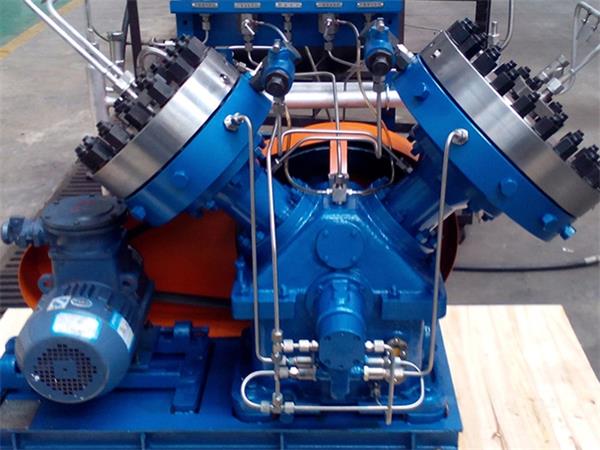The service life of hydrogen refueling station compressors is affected by various factors. Generally speaking, their service life is around 10-20 years, but the specific situation may vary due to the following factors:
One、 Compressor type and design
1. Reciprocating compressor
This type of compressor compresses hydrogen gas through the reciprocating motion of the piston within the cylinder.Its design features make it structurally complex and have many moving parts.In general, if well maintained, the service life of reciprocating compressors may be around 10-15 years.For example, some early designed reciprocating compressors may have a service life of nearly 10 years due to technological and material limitations;The service life of modern reciprocating compressors using advanced materials and optimized designs may be extended to around 15 years.
2. Centrifugal compressor
Centrifugal compressors accelerate and compress hydrogen gas through high-speed rotating impellers.Its structure is relatively simple, with few moving parts, and it operates relatively stably under suitable working conditions.During normal use, the service life of centrifugal compressors can reach 15-20 years.Especially for high-end centrifugal compressors used in some large hydrogen refueling stations, with good maintenance, their service life may be longer.
Two、 Working conditions and operating parameters
1. Pressure and temperature
The working pressure and temperature of hydrogen refueling station compressors have a significant impact on their service life.The working pressure of a typical hydrogen refueling station compressor is between 35-90MPa.If the compressor operates near the high-pressure limit for a long time, it will increase component wear and fatigue, thereby shortening its service life.For example, when the working pressure is continuously maintained at around 90MPa, the service life of the compressor may be shortened by 2-3 years compared to operating at around 60MPa.
In terms of temperature, the compressor generates heat during operation, and excessively high temperatures can affect the performance of components and the strength of materials. Under normal circumstances, the operating temperature of the compressor should be controlled within a certain range, such as not exceeding 80-100 ℃. If the temperature exceeds this range for a long time, it may cause problems such as aging of seals and decreased performance of lubricating oil, which will reduce the service life of the compressor.
2. Flow and load rate
The flow rate of hydrogen determines the load condition of the compressor.If the compressor operates at high flow rates and high load rates (such as exceeding 80% of the design load rate) for a long time, key components such as the motor, impeller (for centrifugal compressors), or piston (for reciprocating compressors) inside will be subjected to significant pressure, accelerating component wear and aging.On the contrary, if the load rate is too low, the compressor may experience unstable operation and have adverse effects on its service life.Generally speaking, it is more appropriate to control the load rate of the compressor between 60% and 80%, which can prolong its service life while ensuring efficiency.
Three、 Maintenance and upkeep status
1. Daily maintenance
Regular inspection, cleaning, lubrication, and other routine maintenance work on compressors are crucial for extending their service life.
For example, regularly replacing lubricating oil and seals can effectively prevent component wear and leakage.It is generally recommended to replace the lubricating oil every 3000-5000 hours, and replace the seals every 1-2 years according to their wear condition.
Cleaning the inlet and outlet of the compressor to prevent impurities from entering the interior is also an important part of daily maintenance.
If the air inlet filter is not cleaned in a timely manner, dust and impurities can enter the compressor, leading to increased component wear and possibly shortening the service life of the compressor by 1-2 years.
2. Regular maintenance and component replacement
Regular comprehensive maintenance of the compressor is the key to ensuring its long-term stable operation.Generally, the compressor should undergo a medium repair every 2-3 years to inspect and repair key components for wear, corrosion, and other issues;Perform a major overhaul every 5-10 years to replace severely worn components such as impellers, pistons, cylinder bodies, etc.By timely maintenance and component replacement, the service life of the compressor can be extended by 3-5 years or even more.
3. Operation monitoring and fault handling
By adopting advanced monitoring systems to monitor the operating parameters of the compressor in real-time, such as pressure, temperature, flow rate, vibration, etc., potential problems can be detected in a timely manner and measures can be taken.For example, when abnormal vibration of the compressor is detected, it may be due to issues such as impeller imbalance or bearing wear. Timely maintenance can prevent the fault from further expanding, thereby extending the service life of the compressor.
Post time: Nov-29-2024


